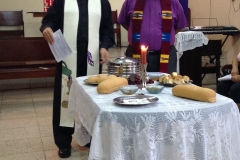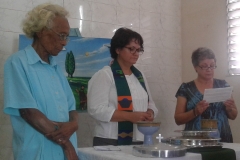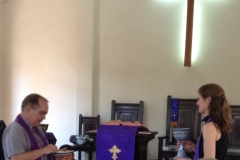A letter from Josey Saez Acevedo and David Cortes Fuentes serving in Cuba | June 2017
Write to David Cortes-Fuentes
Write to Josey Saez-Acevedo
Individuals: Give online to E200519 for David Cortes-Fuentes and Josey Saez-Acevedo’s sending and support
Congregations: Give to D507587 for David Cortes-Fuentes and Josey Saez-Acevedo’s sending and support
Churches are asked to send donations through your congregation’s normal receiving site (this is usually your presbytery).
During the first part of the year, we have received many visitors from partner churches in the United States, presbytery delegations, and ministry groups engaged in specific programs with the Evangelical Seminary of Theology in Cuba and the Church in Cuba. In addition, we had the honor of meeting with Rev. Dr. J. Herbert Nelson, Stated Clerk of the PC(USA) General Assembly; Rev. José Luis Casal, new Director of Presbyterian World Mission; Rev. Dr. Valdir França, Presbyterian World Mission Area Coordinator for Latin America and the Caribbean; and Randy Hobson, Manager of Design and Multimedia, Office of the General Assembly. These visits present us the opportunity to engage in conversations about our ministry in Cuba, the challenges and the opportunities ahead.
The very emotional topic of reconciliation, and its many levels, is one that most often occurs in our conversations. So we reflect on it from the perspective of an invitation to the Lord’s Table, a paradigm of what we see and hope for in the relationships between the Church in Cuba, the Church in the U.S., and the communities of Christians who sit at the Table.
Jesus’ invitation to the Lord’s Supper reminds us of the conflictive nature of our faith and the wounds and conflicts many Christians confront day after day. It should not take us by surprise: after all, the Church was born in a context of conflict, resistance, and persecution. The Gospels’ stories of the events in the last week of Jesus’ life are full of conflicts. We may remember that the religious leaders of the time did not take the overturning of the money changers’ tables and the disruption of business as usual in the temple positively (Mark 11:15-19). The Gospels tell us about disputes among religious and political leaders about Jesus’ authority (Mark 11:27-33), paying taxes to Caesar (Mark 12:13-17), and other interesting theological topics . . . . These were days of divisions and conflict.
Jesus’ last dinner with his disciples is the last of many other dinners that Jesus had throughout his ministry. Some of these dinners were with friends, such as Martha, Mary, and Lazarus (John 12:1-2); some were with his disciples; some were with large crowds of people, for instance, when Jesus fed the multitude bread and fishes (Mark 6:30-44; 8:1-10); and many others (probably the majority) were with sinners and tax collectors (Mark 2:13-17). Many proponents and defenders of the traditions of the time were in disagreement with Jesus’ custom of eating and drinking with less-than-perfect people. We know of these disagreements because Jesus’ message about the Kingdom of God required a change of mind and lifestyle from those who benefited from the traditional defenders of the status quo.
We know of many examples throughout the history of the church when teaching and liturgical practices have been occasions for conflicts. Documents of the early church (such as the Didache and Didascalia) describing the celebration of the Eucharist include instructions about loving one another, appeals for solidarity with the persecuted, and calls to share financial resources with the most vulnerable among the believers. During this time church leaders called for the attention of those whose charity did not go far enough to include changes of hearts.
These experiences of disagreements and conflict did not inhibit the church from continuing to celebrate the Lord’s Supper with one another. On the contrary, following Jesus’ teaching about the love of God—how God welcomes back the runaway child (Luke 15:11-32), how God receives and restores sinners, and how God calls for new relationships—the church continues celebrating the Lord’s Supper, inviting everyone who trusts in Jesus to partake in the sharing of the bread and the wine. Celebrating the Lord’s Supper today includes a remembrance of Jesus’ many dinners, the unsettling feeling of communion with people with whom we disagree and people very different from us. It includes a celebration of Jesus’ giving himself in faithful obedience to the will of God, even to his last breath. And celebrating the Lord’s Supper today includes the hopeful expectation of a new experience of being a community where, by the power of the Holy Spirit, we can journey to experience, even here, the foretasting of the Kingdom of God.
Today, many Christians still join one another around the Lord’s Table as one Church, with one joyful heart. But today many Christians also join one another around this Table knowing that their communities, their faith, and their lives are endangered by acts of violence sowing terror, death, and destruction. We know of refugees, of divided families, of contemporary martyrs, and of church leaders who have left home because of threats and persecution. When we celebrate the Lord’s Supper, we stand in solidarity with our brave brothers and sisters living and witnessing their faith in the worst of circumstances. Breaking the bread and pouring the wine, we stand in prayer with and for our brothers and sisters, and we stand in prayer with and for ourselves so that we may be as brave as they are. We stand in prayer for those responsible for suffering, for forgiveness, for reconciliation, and for the opportunity to walk together in building a more just, free, and loving humanity.
Jesus did not hide from conflict and disagreements. He responded to conflict by talking about God’s love, healing the sick, empowering the poor and persecuted, and giving himself on the cross. As we celebrate Jesus’ last supper, we believe that this is not (and will not be) our last supper. On the contrary, it is an opportunity to start thinking again about reconciliation. Not only about reconciliation between nations, but also reconciliation between members of our families and between Christians who share the same faith but are divided by policies and politics that do not represent the best values of the Gospel. It is an opportunity for reconciliation with every Christian everywhere. So we commit ourselves to celebrate many other suppers, many more Lord’s Suppers, praying for reconciliation, witnessing God’s loving peace, working together for justice, expecting something good, a new future of Christians in the North and on the Island, reconciled in love . . . until the Lord comes again. Amen.
We understand our ministry in Cuba as a part of the ministry of reconciliation needed between the Christian communities in Cuba and the U.S., the ministry of reconciliation between North American and Cuban families, and the ministry of reconciliation between Cubans in the U.S and Cubans on the Island. So, if you feel called to do so, supporting our ministry and work in Cuba is a way to answer God’s invitation to help the PC(USA) continue supporting us for the years to come. Supporting our ministry in Cuba is a way to share in the Lord’s table.
David Cortés-Fuentes & Josey Sáez Acevedo
![]() You may freely reuse and distribute this article in its entirety for non-commercial purposes in any medium. Please include author attribution, photography credits, and a link to the original article. This work is licensed under a Creative Commons Attribution-NonCommercial-NoDeratives 4.0 International License.
You may freely reuse and distribute this article in its entirety for non-commercial purposes in any medium. Please include author attribution, photography credits, and a link to the original article. This work is licensed under a Creative Commons Attribution-NonCommercial-NoDeratives 4.0 International License.


